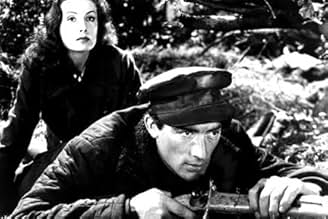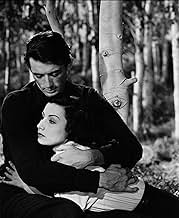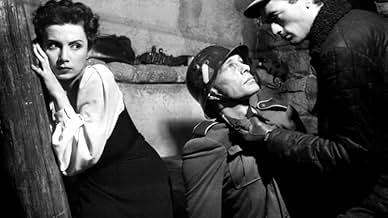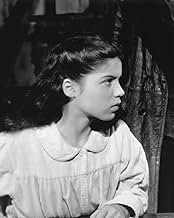IMDb-BEWERTUNG
6,1/10
1490
IHRE BEWERTUNG
Füge eine Handlung in deiner Sprache hinzuA heroic guerrilla group fights back against impossible odds during the 1941 German invasion of the Soviet Union.A heroic guerrilla group fights back against impossible odds during the 1941 German invasion of the Soviet Union.A heroic guerrilla group fights back against impossible odds during the 1941 German invasion of the Soviet Union.
- Regie
- Drehbuch
- Hauptbesetzung
- Für 1 Oscar nominiert
- 3 Gewinne & 1 Nominierung insgesamt
Tamara Toumanova
- Nina
- (as Toumanova)
Glen Vernon
- Mitya
- (as Glenn Vernon)
Edward L. Durst
- Petrov
- (as Edward Durst)
Maria Bibikov
- Vera
- (Nicht genannt)
William Challee
- Ducrenko
- (Nicht genannt)
Gretl Dupont
- Mariya
- (Nicht genannt)
Charles H. Faber
- German Corporal
- (Nicht genannt)
Erford Gage
- Col. Prilenko
- (Nicht genannt)
Peter Helmers
- Von Rundhol
- (Nicht genannt)
Adolf E. Licho
- Anton
- (Nicht genannt)
Empfohlene Bewertungen
A group of Soviet guerrillas operate out of a hideout behind enemy lines. Vladimir (Gregory Peck) is the heroic commander. He falls for the civilian dancer Nina Ivanova. A German soldier stumbles upon the hidden camp and is taken prisoner. Nina is horrified with Vladimir's willingness to kill a POW. When the soldier tries to escape, Nina is the one who kills him. Harden partisan Yelena is also in love with Vladimir but she is shot on a mission.
This is old fashion melodrama set in backdrop of the war. The Russians are still allies and there is a fair amount of propaganda work involved in this. The most notable is the theatrical debut of Peck. He's among several stage actors involved in this production. He's young, gaunt, and rather commanding. He enters the movie after the first fifteen minutes. Obviously, somebody would have made him the overwhelming star of the film if they knew his legendary career to come. As it is, he is the lead in an ensemble cast.
This is old fashion melodrama set in backdrop of the war. The Russians are still allies and there is a fair amount of propaganda work involved in this. The most notable is the theatrical debut of Peck. He's among several stage actors involved in this production. He's young, gaunt, and rather commanding. He enters the movie after the first fifteen minutes. Obviously, somebody would have made him the overwhelming star of the film if they knew his legendary career to come. As it is, he is the lead in an ensemble cast.
Vladimir (Gregory Peck) leads a group of guerrillas against the Nazi invaders in the forests of Russia. His small group is waiting for the order to attack. It finally comes with the message "The snow will fall".
The film is well acted with tense moments, eg, when the German soldier makes his escape with only Nina (Tamara Toumanova) in the hideout to defend herself alone against him. The group dynamics are well portrayed within this troupe of rebels and there is a very human element to the story. There are poignant scenes including Nina's silence when Mitya (Glenn Vernon) is taken by the Germans and the film has a memorable ending. It's patriotic but it's still a good film.
The film is well acted with tense moments, eg, when the German soldier makes his escape with only Nina (Tamara Toumanova) in the hideout to defend herself alone against him. The group dynamics are well portrayed within this troupe of rebels and there is a very human element to the story. There are poignant scenes including Nina's silence when Mitya (Glenn Vernon) is taken by the Germans and the film has a memorable ending. It's patriotic but it's still a good film.
The Russian German war was the greatest battle ever fought and strangely has been ignored by Hollywood. This film, made when the Russians had yet to reach Berlin, was probably a propaganda piece of its time and suffers from some sugary Hollywood treatment. The appearance of a Moscow ballet dancer, and her inevitable love affair with the local guerilla leader, glamourises what was, in reality, a dirty hard war. Whilst we can respect this well-directed movie we can also ask why Hollywood has yet to record its tribute to the amazing determination of the Russian people who were not particularly well led yet overcame such enormous odds. Never mind "Saving Private Ryan" - what about Ivan's story, Mr Spielberg? The Cold War is over, the archives are open, the film is there to be made!
Gregory Peck is the leader of a group of Russian Guerillas who are fighting the invading Nazis. Peck is the leader of the group but there isn't that many people in the group, they even have a teenager and his younger sister helping out. They also have a woman sharpshooter and several other members. They go out at night to do some damage and hide out by day. They take in a ballet dancer who doesn't want to kill but winds up killing an escaping Nazi. Peck and the dancer end up falling in love and have several love scenes together. They blow up an ammunition train and they also have to hold off some Nazis when the Russians want to do a counter-attack. This was Gregory Peck's first film but this wasn't his best film.
Pray silence, workers and peasants, for a "cast of new personalities" headed by the debut of "Mr Gregory Peck, distinguished actor on the New York stage".
A suitably solemn intro for the late Mr P, who supplies a characteristically cigar-store-Indianesque turn as the darkly handsome Russian dam-builder turned train-buster, heading a WW2 band of partisans (i.e., terrorists). His stern Soviet soul is melted only by a sultry ballerina who is stranded with the gang. Other members include a comic peasant double act, a learned Oxonian sidekick and a winsome teen brother and sister, one of whom ends on a Nazi noose (the wrong one, given the girl's saccharine performance).
This retrospectively hilarious and morally objectionable whitewashing of the most murderous tyranny in history- the communist USSR- fudges its politics like all the Hollywood "enemy of my enemy is my friend" wartime propaganda pieces. "Socialism" as the Peck character's creed is never mentioned. Inspiration for the partisans' efforts is made out to be no more than a worthy resentment of trespassers on their home ground, whether it's a dictatorship or not. (By the same logic Hollywood should now be shooting films justifying Iraqi guerilla resistance to the Americo-British occupation, but don't hold your breath.) The unpalatable truth that many in the western Soviet Union welcomed and collaborated with the Germans has to be evaded. In this flick, solidarity is absolute.
Apart from this hollowness at the core, the film is a decent string of shoot-em-ups in a convincingly icy studio landscape. The stage actors in the cast were and remained unfamiliar, making the thing seem a mite more authentic than, say, "For Whom the Bell Tolls". But Ms Toumanova, the producer's girlfriend at the time, conceives emotional acting as gazing into the remote distance with her lips slightly parted: the influence of Garbo was disastrous! And it would take Selznick and King Vidor to extract a full-blooded performance from Peck, in "Duel in the Sun". It's curious, incidentally, that Casey Robinson, writer and producer of this paean to Stalin, never got serious heat from the House Un-American Activities Committee after the war. Did he cut a deal?
A suitably solemn intro for the late Mr P, who supplies a characteristically cigar-store-Indianesque turn as the darkly handsome Russian dam-builder turned train-buster, heading a WW2 band of partisans (i.e., terrorists). His stern Soviet soul is melted only by a sultry ballerina who is stranded with the gang. Other members include a comic peasant double act, a learned Oxonian sidekick and a winsome teen brother and sister, one of whom ends on a Nazi noose (the wrong one, given the girl's saccharine performance).
This retrospectively hilarious and morally objectionable whitewashing of the most murderous tyranny in history- the communist USSR- fudges its politics like all the Hollywood "enemy of my enemy is my friend" wartime propaganda pieces. "Socialism" as the Peck character's creed is never mentioned. Inspiration for the partisans' efforts is made out to be no more than a worthy resentment of trespassers on their home ground, whether it's a dictatorship or not. (By the same logic Hollywood should now be shooting films justifying Iraqi guerilla resistance to the Americo-British occupation, but don't hold your breath.) The unpalatable truth that many in the western Soviet Union welcomed and collaborated with the Germans has to be evaded. In this flick, solidarity is absolute.
Apart from this hollowness at the core, the film is a decent string of shoot-em-ups in a convincingly icy studio landscape. The stage actors in the cast were and remained unfamiliar, making the thing seem a mite more authentic than, say, "For Whom the Bell Tolls". But Ms Toumanova, the producer's girlfriend at the time, conceives emotional acting as gazing into the remote distance with her lips slightly parted: the influence of Garbo was disastrous! And it would take Selznick and King Vidor to extract a full-blooded performance from Peck, in "Duel in the Sun". It's curious, incidentally, that Casey Robinson, writer and producer of this paean to Stalin, never got serious heat from the House Un-American Activities Committee after the war. Did he cut a deal?
Wusstest du schon
- WissenswertesFilm debut of Gregory Peck.
- Crazy CreditsOpening credits: Presenting the motion picture debut of a cast of new personalities.
- VerbindungenFeatured in American Masters: A Conversation with Gregory Peck (1999)
Top-Auswahl
Melde dich zum Bewerten an und greife auf die Watchlist für personalisierte Empfehlungen zu.
- How long is Days of Glory?Powered by Alexa
Details
Box Office
- Budget
- 958.000 $ (geschätzt)
- Laufzeit1 Stunde 26 Minuten
- Farbe
- Seitenverhältnis
- 1.37 : 1
Zu dieser Seite beitragen
Bearbeitung vorschlagen oder fehlenden Inhalt hinzufügen
































